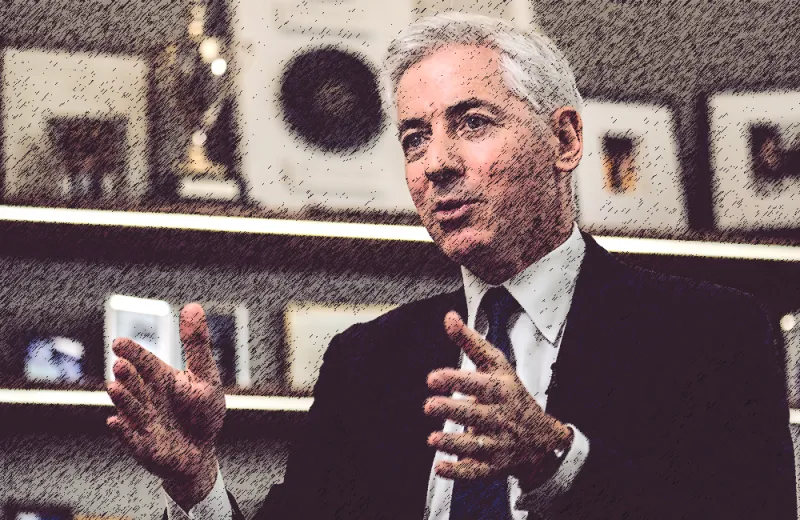Hedge fund manager Bill Ackman has abandoned hopes of listing his publicly-traded Pershing Square Holdings hedge fund in the United States. Instead, he has filed registration papers for a separate closed-end mutual fund in the U.S that will target retail investors.
Ackman has talked about a U.S. listing for years, but at Pershing Square’s annual meeting with investors in London — where the European hedge fund trades on the London Stock Exchange — he said that while the company has “thoroughly examined the options for a U.S. listing to increase the number of investors who own PSH [Pershing Square Holdings],” it encountered numerous issues that led it to abandon the plan.
“Ultimately we decided it was not viable,” he said in a presentation to investors.
Ackman had hoped to find a merger candidate large enough to become the dominant asset of the fund in order to avoid prohibitions on the trading of hedge funds in the U.S., as a result of restrictions under the Investment Company Act of 1940. But given PSH’s asset size of more than $14 billion, that was a difficult task. Indeed, Ackman said he found “issues with asset size and relative size of merger candidates,” among other issues, as prohibitive.
“PSH will remain a publicly traded closed-end fund over the long term,” he said.
Attracting U.S. investors to the hedge fund was seen as a way help reduce Pershing Square Holdings shares’ massive discount to net asset value. But now that number seems to be moving in the right direction. After last year’s blowout performance of 26.7 percent, PSH’s discount to NAV narrowed by 4.5 percentage points from 33.2 percent in the beginning of 2023 to 28.7 percent at year end, according to the presentation. This year the discount has narrowed further to 27 percent.
The new fund Ackman plans to launch won’t be a hedge fund, which means there are no restrictions on who can purchase the shares. Unlike a hedge fund, it won’t be able to charge a performance fee, and can’t trade as freely as hedge funds can. It also won’t charge a management fee for the first 12 months. (After that, the fee will be 2 percent.)
“The adviser believes that the fund has the potential to be one of the largest, if not the largest, listed closed-end fund and expects that the adviser’s brand-name profile and broad retail following will drive substantial investor interest and liquidity in the secondary market,” Ackman said in the filing.
Over the past year, Ackman has developed a brand name beyond hedge fund circles with his high profile on X, formerly known as Twitter, where his followers have almost doubled to 1.2 million. But he has also become a polarizing figure, as he has taken a number of controversial positions and allied himself with several right-wing cultural positions and individuals, including former Republican presidential candidate Vivek Ramaswamy.
More recently, his hedge fund’s New York City offices were picketed by civil rights activist Rev. Al Sharpton’s followers after Ackman was viewed as instrumental in the resignation of Harvard’s first Black president, Dr. Claudine Gay, whom he lambasted almost daily on X.
Controversies aside, Ackman’s investment prowess could be a benefit to fundraising, as it comes at a time when the fund is flying high. Last year Pershing Square Holdings’ stellar gains landed Ackman on the annual ranking of the top 20 money managers by LCH Investments Chairman Rick Sopher. The ranking is based on lifetime earnings for investors.
The new fund’s registration statement was filed the day before Pershing Square’s annual meeting with investors. At that time Ackman said that the new fund and others that Pershing Square Capital may launch in the future will eventually reduce fees at the European fund.
Pershing Square Holdings will receive a fee reduction of 20 percent of management fees that Pershing Square earns on all new funds that invest in public securities — and that do not charge performance fees, according to the firm.
Pershing Square Holdings was designed to offer a reduction in performance fees equal to 20 percent of those earned by its other funds after the costs of its IPO were repaid. But the firm was unable to charge performance fees on its traditional hedge funds for years, due to losses on its investment in Valeant and its Herbalife short, so no reduction has been achieved despite the fund’s comeback in recent years.
The day before the investor meeting, Pershing Square changed the terms of the initial agreement and as a result will “be able to benefit from reduced performance fees immediately,” according to its presentation to investors.
.







